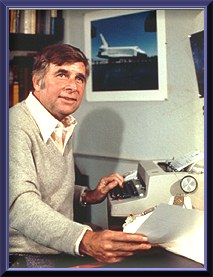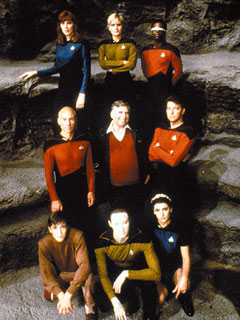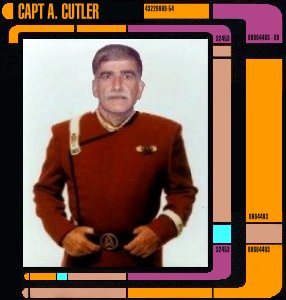YOU ARE ACCESSING THE LCARS COMMAND INTERFACE - RODDENBERRY DATABANK
GENE RODDENBERRY - CREATOR OF STAR TREK
"The Great Bird of the Galaxy"
Gene Roddenberry, writer, film and television producer, led a life as colourful and exciting as almost any high-adventure fiction. He was born in El Paso, Texas, on August 19, 1921, his family moved to Los Angeles when he was three, and there he spent his boyhood with his brother, Bob, and sister, Doris. After leaving High School, he studied three years of college pre-law and then transferred his academic interest to aeronautical engineering and qualified for a pilot's license.
The more extreme end of the fan spectrum has been known to hail Star Trek's creator Gene Roddenberry as a great; 20th century humanist. But his detractors accuse him of saddling Star Trek with a slushy moralizing agenda that prevents it from realizing its potential as amateur science fiction series.
A larger-than-life, bluff and vivacious man, Roddenberry worked on a variety of successful TV series in the '50s and '60s such as 'Have Gun Will Travel' and 'The Lieutenant'. He toyed for years with the idea of producing an intelligent sci-fi show with an ensemble cast frequently describing what was to become Star Trek as 'a Wagon Train to the Stars'.
Roddenberry fought a long campaign to bring Trek to the screen. The first pilot, 'The Cage', was ejected for being 'too cerebral'. The second, introducing the crucial Kirk and Spock axis, gave the series the green light. Yet the original Star Trek (1966-1969) only lasted three seasons and it was only with the help of syndicated repeats that Roddenberry's baby.

24 October 1991
Roddenberry has been blamed and lampooned for the sexism of the original Star Trek. Yet, when compared to other '60s shows, Star Trek comes off relatively well in this regard. It was NBC who blocked Roddenberry's wish to have a young Majel Barrett as second-in-command of the Enterprise, claiming that even by the 24th Century this kind of leap in gender roles would be too much for sensitive viewers to bear. Roddenberry eventually redrafted Barrett - his future wife - into the role of the Spock-smitten Nurse Chapel.
He saw the Next Generation as a chance to correct some of the original series' flaws. Thus the captain was no longer automatically beamed down to dangerous planets, and women were given higher profile roles. And the saucer section of the ship was now detachable. By and large Roddenberry's improvements showed maturity, most notably in the casting of a Shakespearian actor as an unexpectedly intellectual captain and the brilliant political move of introducing a Klingon to the ship's bridge. Deep Space Nine, the Maquis and the current bleak and unpredictable state of Federation politics in the Alpha Quadrant all mark a shift away from Roddenberry's utopian ideal. Yet the deference to Roddenberry's vision remains. The film series, Deep Space Nine and Voyager have never truly broken out of the cast created by Star Trek's originator.

When Roddenberry died in 1992 the fifth season Next Generation two-parter 'Unification' - which fittingly represented the joining of the old and new Star Treks and the success of his TV franchise - was dedicated to him.
His critics, who tend also to be fans of the more gritty, combative style of Deep Space Nine, argue that he was responsible for limiting the scope of the programme and forcing on it a stifling ethical tone. His supporters respond by saying that it is Star Trek's optimism that has secured its appeal.
Roddenberry's vision could easily be dismissed as pat, but he did at least apply it with conviction and consistency. Star Trek was an extremely political programme for its time. It can be mocked now, but choosing to have a multi-racial crew (African, Asian, American, Russian, Scottish and, of course, Vulcan) to represent humanity's progress was actually a brave decision in the world of '60s US TV.

What everyone should now know is that Star Trek became the first television series to have an episode preserved in the Smithsonian, where an 11-foot model of the U.S.S. Enterprise is also exhibited on the same floor as the Wright brother's original airplane and Lindbergh's "Spirit of St. Louis." In addition to the Smithsonian honours, NASA's first space shuttle was named Enterprise, in response to hundreds of thousands of letters from fans demanding that the shuttle be named after the beloved Starship.
Key Gene Roddenberry Episodes:
The Cage (TOS), The Corbomite Maneuver (TOS)
City on the Edge of Forever, (TOS)
Mirror, Mirror (TOS), Encounter at Farpoint (TNG)
Unification (TNG).
In addition to having served as executive consultant on Star Trek feature productions, Roddenberry added "novelist" to his writing repertoire. His novelization of "Star Trek: The Motion Picture" (Pocket Books, 1979) sold close to a million copies and was ranked number one on the national bestseller lists for many weeks. The legacy of Star Trek, as created by Gene Roddenberry, continues to grow as the newest series, Enterprise, joins Star Trek: Deep Space Nine and Star Trek: Voyager. Star Trek: The Next Generation has evolved into a feature film series, debuting in 1994 with "Star Trek Generations." Roddenberry is often affectionately referred to as the "Great Bird of the Galaxy."

My 'Salute to you Gene'



Last edited by Adge - June 2004

"The Great Bird of the Galaxy"
Gene Roddenberry, writer, film and television producer, led a life as colourful and exciting as almost any high-adventure fiction. He was born in El Paso, Texas, on August 19, 1921, his family moved to Los Angeles when he was three, and there he spent his boyhood with his brother, Bob, and sister, Doris. After leaving High School, he studied three years of college pre-law and then transferred his academic interest to aeronautical engineering and qualified for a pilot's license.
The more extreme end of the fan spectrum has been known to hail Star Trek's creator Gene Roddenberry as a great; 20th century humanist. But his detractors accuse him of saddling Star Trek with a slushy moralizing agenda that prevents it from realizing its potential as amateur science fiction series.
A larger-than-life, bluff and vivacious man, Roddenberry worked on a variety of successful TV series in the '50s and '60s such as 'Have Gun Will Travel' and 'The Lieutenant'. He toyed for years with the idea of producing an intelligent sci-fi show with an ensemble cast frequently describing what was to become Star Trek as 'a Wagon Train to the Stars'.
Roddenberry fought a long campaign to bring Trek to the screen. The first pilot, 'The Cage', was ejected for being 'too cerebral'. The second, introducing the crucial Kirk and Spock axis, gave the series the green light. Yet the original Star Trek (1966-1969) only lasted three seasons and it was only with the help of syndicated repeats that Roddenberry's baby.

24 October 1991
Roddenberry has been blamed and lampooned for the sexism of the original Star Trek. Yet, when compared to other '60s shows, Star Trek comes off relatively well in this regard. It was NBC who blocked Roddenberry's wish to have a young Majel Barrett as second-in-command of the Enterprise, claiming that even by the 24th Century this kind of leap in gender roles would be too much for sensitive viewers to bear. Roddenberry eventually redrafted Barrett - his future wife - into the role of the Spock-smitten Nurse Chapel.
He saw the Next Generation as a chance to correct some of the original series' flaws. Thus the captain was no longer automatically beamed down to dangerous planets, and women were given higher profile roles. And the saucer section of the ship was now detachable. By and large Roddenberry's improvements showed maturity, most notably in the casting of a Shakespearian actor as an unexpectedly intellectual captain and the brilliant political move of introducing a Klingon to the ship's bridge. Deep Space Nine, the Maquis and the current bleak and unpredictable state of Federation politics in the Alpha Quadrant all mark a shift away from Roddenberry's utopian ideal. Yet the deference to Roddenberry's vision remains. The film series, Deep Space Nine and Voyager have never truly broken out of the cast created by Star Trek's originator.

When Roddenberry died in 1992 the fifth season Next Generation two-parter 'Unification' - which fittingly represented the joining of the old and new Star Treks and the success of his TV franchise - was dedicated to him.
His critics, who tend also to be fans of the more gritty, combative style of Deep Space Nine, argue that he was responsible for limiting the scope of the programme and forcing on it a stifling ethical tone. His supporters respond by saying that it is Star Trek's optimism that has secured its appeal.
Roddenberry's vision could easily be dismissed as pat, but he did at least apply it with conviction and consistency. Star Trek was an extremely political programme for its time. It can be mocked now, but choosing to have a multi-racial crew (African, Asian, American, Russian, Scottish and, of course, Vulcan) to represent humanity's progress was actually a brave decision in the world of '60s US TV.

What everyone should now know is that Star Trek became the first television series to have an episode preserved in the Smithsonian, where an 11-foot model of the U.S.S. Enterprise is also exhibited on the same floor as the Wright brother's original airplane and Lindbergh's "Spirit of St. Louis." In addition to the Smithsonian honours, NASA's first space shuttle was named Enterprise, in response to hundreds of thousands of letters from fans demanding that the shuttle be named after the beloved Starship.
Key Gene Roddenberry Episodes:
The Cage (TOS), The Corbomite Maneuver (TOS)
City on the Edge of Forever, (TOS)
Mirror, Mirror (TOS), Encounter at Farpoint (TNG)
Unification (TNG).
In addition to having served as executive consultant on Star Trek feature productions, Roddenberry added "novelist" to his writing repertoire. His novelization of "Star Trek: The Motion Picture" (Pocket Books, 1979) sold close to a million copies and was ranked number one on the national bestseller lists for many weeks. The legacy of Star Trek, as created by Gene Roddenberry, continues to grow as the newest series, Enterprise, joins Star Trek: Deep Space Nine and Star Trek: Voyager. Star Trek: The Next Generation has evolved into a feature film series, debuting in 1994 with "Star Trek Generations." Roddenberry is often affectionately referred to as the "Great Bird of the Galaxy."

My 'Salute to you Gene'


Last edited by Adge - June 2004